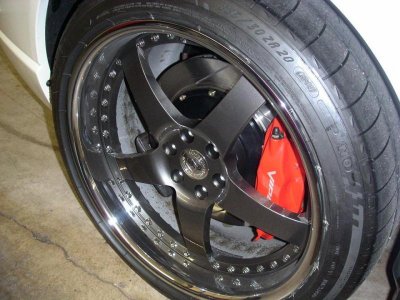JayW1
Enthusiast
I purchased a StopTech four wheel brake kit from John B. back in early January but have not had a chance to install it until two days ago. I installed it Thursday and Friday night and was excited to take it out this morning (Saturday) to bed the pads and see how it performed. Everything went great until I got home and looked at my wheels which were covered with brake fluid (and of course dust from the severe bedding procedure). I removed the front calipers to determine the source of the leak and it looks like they are leaking from the center joint line where the two halves of the caliper are squeezed together. All the piston seals were intact, the cross over tube fittings, the bleeder screws, and the banjo fitting from the break line to the caliper. I don’t know enough about the calipers to even know if there are some internal seals or o-rings between the two halves or if they even have fluid running through them.
I can’t call Stoptech until Monday but I am really disappointed to say the least after all the money and time I have invested in this kit. Not only that, but I didn’t get the brake fluid off the rear wheels quick enough and it ruined some areas of my clear coat on the inside of the rim.
Just wondering if anyone else has experienced anything similar with StopTech calipers (ST-40’s) or other calipers in general. Is there something I am overlooking or misinterpreting? It is difficult to determine the exact location of the leak as there was fluid along both joint lines on the inside (rotor side) of the caliper. All of the calipers leaked but the left rear leaked the least. After cleaning the front wheels and taking it out again, I started feeling a small amount of fluid on the bottom of the front calipers again but wasn’t braking as hard as during the bedding procedure. If anyone can give any insight into this I would appreciate it. I am going to have a hard time waiting until Monday but when I get an answer I will post an update.
Here are a couple pics of one of the wheels showing the fluid on the inside of the rim.
I can’t call Stoptech until Monday but I am really disappointed to say the least after all the money and time I have invested in this kit. Not only that, but I didn’t get the brake fluid off the rear wheels quick enough and it ruined some areas of my clear coat on the inside of the rim.
Just wondering if anyone else has experienced anything similar with StopTech calipers (ST-40’s) or other calipers in general. Is there something I am overlooking or misinterpreting? It is difficult to determine the exact location of the leak as there was fluid along both joint lines on the inside (rotor side) of the caliper. All of the calipers leaked but the left rear leaked the least. After cleaning the front wheels and taking it out again, I started feeling a small amount of fluid on the bottom of the front calipers again but wasn’t braking as hard as during the bedding procedure. If anyone can give any insight into this I would appreciate it. I am going to have a hard time waiting until Monday but when I get an answer I will post an update.
You must be registered for see images attach
You must be registered for see images attach
Here are a couple pics of one of the wheels showing the fluid on the inside of the rim.


